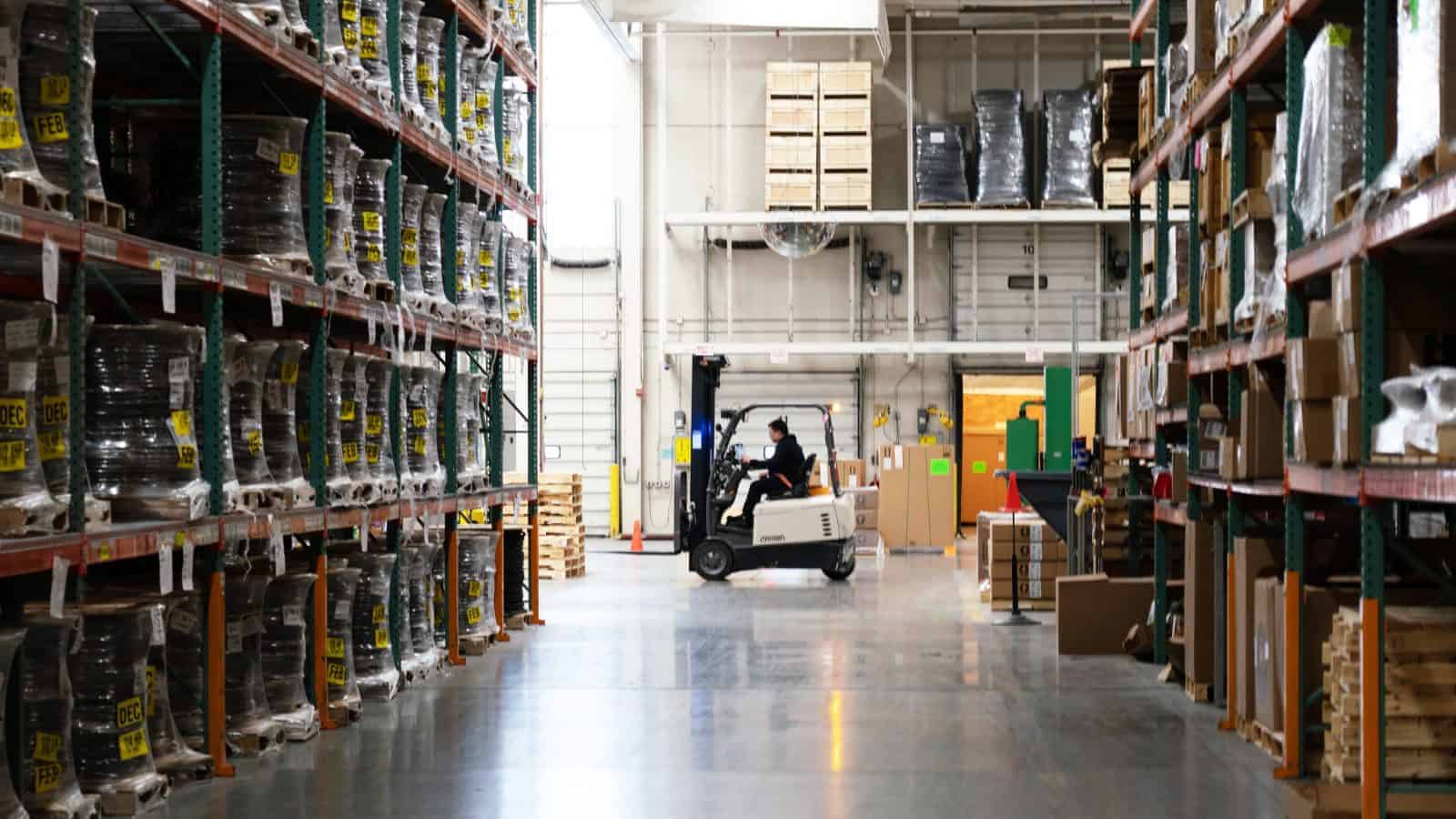The NAM Revives High-Level U.S.–U.K. Talks

The NAM’s Competing to Win Tour in Europe moved on to London early this week, highlighting the imperative to shore up the U.S.–U.K. relationship—and to urgently address other barriers, like permitting reform and workforce shortages, to enable the U.S. to help allies in the face of Russian aggression and other geopolitical threats.
The issue: Russia’s unprovoked war in Ukraine, the aftermath of the worldwide pandemic and China’s quest for global leadership create a new urgency for expanded trade opportunities between democratic countries.
- The U.S. and the U.K. must work together to shore up supply chains, enhance energy security, boost resiliency and create growth, as NAM President and CEO Jay Timmons emphasized.
The details: Timmons crisscrossed London on Monday and Tuesday, promoting the manufacturing industry and reinforcing its priorities with senior government ministers and officials, including:
- Nigel Huddleston MP, the U.K. minister of state for international trade
- Jonathan Reynolds, Labour Party shadow business secretary (one of the architects of the Labour Party’s industrial plan)
- Jane Hartley, U.S. Ambassador to the Court of St. James’s
Support at home: During his visit, Timmons did an interview with CNN International to discuss the NAM’s new Outlook survey, which found that 77% of manufacturers want to see more trade agreements with Europe.
Making industry connections: At the NAM’s sister organization Make UK, Timmons joined a roundtable with CEO Stephen Phipson and addressed some of Britain’s leading manufacturing companies.
- He spoke about how the U.S. and the U.K. can unlock new trading opportunities going forward and bolster democracy by strengthening commerce.
- The two groups also reaffirmed their commitment to share market intelligence, data and policy work, as well as to facilitate visits for economic delegations promoting trade, investment and commercial opportunities.
- They also voiced their continued and mutual support of the Ukrainian people and of the democratic institutions in their own countries.
What they said: “The ties between the UK and United States go back a long way and we have significant political, economic and trade connections,” said Phipson. “Relations with the US are vital and its market is the second most important for UK goods. In a post-Brexit world, it is likely to assume ever greater importance as part of our efforts to boost global trade.”
- “As world events have made abundantly clear, strengthening democracy, the free enterprise system and strategic alliances in our countries and around the world is essential to our future and the fight against tyranny,” said Timmons. “As the U.S. and the U.K. take steps to build a stronger, more open and secure economic relationship, the NAM urges our leaders to move toward a new U.S.–U.K. market-opening trade agreement that includes strong, clear and enforceable outcomes.”
Meeting manufacturers: In addition, Timmons met with manufacturers that have operations or pending operations in both the U.K. and the U.S. Energy security and regulatory certainty, as well as the worker shortage in the industry, also took center stage in these discussions.
Bottom line: “The tour’s time in London matters to manufacturers in the United States because it strengthens the ‘special relationship’ between the U.S. and the U.K. and boosts the prospects for enhanced cross-Atlantic trade, supporting manufacturing jobs in both countries,” said Ken Monahan, NAM Vice President of International
New Survey: Manufacturers Want Increased Trade with Europe
New Regulations and Taxes Will Hurt Expansion
London, U.K. – As the National Association of Manufacturers’ Competing to Win Tour begins its second week of bolstering strategic alliances across Europe, the association released findings from its Q1 2023 Manufacturers’ Outlook Survey. The survey found that expanding trading opportunities with Europe is a top priority for manufacturers, with more than 77% of respondents supporting negotiating new agreements with European nations.
“At a time when democracy and free enterprise are under attack from forces around the world, America can provide the leadership needed to defend our values, our institutions and our way of life,” said NAM President and CEO Jay Timmons. “By advancing an ambitious trade agreement agenda, we can ensure that the U.S.—and not competitors like China—writes the rules for the global economy and trading system. That has been the focus of our conversations with government, association and business leaders across Europe over the past week.”
The survey also continues to illustrate the need for Washington to enact policies that support the sector’s competitiveness as businesses face record job openings and increased production and input costs.
“With geopolitical turmoil and a banking crisis injecting further uncertainty into the economy, policymakers must act with urgency on key tax, trade, permitting and regulatory proposals if they want to help manufacturers in America fend off a recession,” said Timmons.
Background: Manufacturers have called on Congress and the White House to address key tax, trade, and permitting policies in recent months and have pressed lawmakers to work across the aisle to move legislation. The NAM conducted the survey from Feb. 21 to March 7, 2023.
Key Findings:
- Of companies that are engaged in international trade, nearly two-thirds of manufacturers said that Europe was either a somewhat or very important market for their company. With that in mind, 77.7% would support U.S. efforts to launch market-opening trade agreement negotiations with countries in Europe.
- Nearly three-quarters of respondents (74.9%) listed attracting and retaining a quality workforce as a primary business challenge, with increased raw material prices (60.1%) and supply chain challenges (55.8%) the next biggest impediments.
- More than 90% of respondents said that higher tax burdens on manufacturing income would make it difficult for their companies to expand their workforce, invest in new equipment or expand their facilities. Similarly, 93.9% suggest that increased regulatory burdens would weaken their ability to invest in their workers, equipment or facilities.
- More than 74% of respondents said that permitting reform—which would simplify and speed up the approval process for new projects—would be helpful to their manufacturing company, allowing them to hire more workers, expand their business or increase wages and benefits.
- More than 55% of respondents said that new proposed air standards from the Environmental Protection Agency would raise their costs of compliance, with roughly one-third suggesting that it would lead to increased permitting challenges and lessen investment and facility expansion plans.
Conducted by NAM Chief Economist Chad Moutray, the Manufacturers’ Outlook Survey has surveyed the association’s membership of 14,000 manufacturers of all sizes on a quarterly basis for the past 25 years to gain insight into their economic outlook, hiring and investment decisions and business concerns.
The NAM releases these results to the public each quarter. Further information on the survey is available here.
-NAM-
The National Association of Manufacturers is the largest manufacturing association in the United States, representing small and large manufacturers in every industrial sector and in all 50 states. Manufacturing employs nearly 13 million men and women, contributes $2.81 trillion to the U.S. economy annually and accounts for 55% of private-sector research and development. The NAM is the powerful voice of the manufacturing community and the leading advocate for a policy agenda that helps manufacturers compete in the global economy and create jobs across the United States. For more information about the NAM or to follow us on Twitter and Facebook, please visit www.nam.org.
President Biden’s Visit to Canada Strengthens Democratic Alliances and Promotes North American Manufacturing Growth
Washington, D.C. and Ottawa, Canada – The following is a joint statement from National Association of Manufacturers President and CEO Jay Timmons and Canadian Manufacturers & Exporters President and CEO Dennis Darby on the occasion of the first official visit of U.S. President Joe Biden to Canada:
“The historic ties between Canada and the United States have created one of the strongest bilateral partnerships of any two countries in the world. As neighbors, friends and as manufacturers, we have always worked together to support our industry and the millions of jobs it provides.
“President Biden’s visit to Canada is an opportunity for our two countries to rededicate ourselves to deepening these ties, to redoubling our efforts to grow North American manufacturing and to taking full advantage of the United States–Mexico–Canada Agreement.
“To achieve these goals, we must support regional integration, supply chain resilience and sustained economic growth, innovation and jobs. We must also continue to coordinate our efforts to address climate change, develop critical minerals and drive the clean energy transition, while also ensuring that manufacturers across our region have access to all forms of energy.
“As world events make abundantly clear, strengthening economic and strategic alliances between democracies is essential to our future and to countering those that want to undermine our way of life. At every opportunity, we must strengthen democracy and the free enterprise system in our countries and around the world.
“We must take on all these challenges, together, so that the manufacturing industry can continue to lead our economies forward and drive our countries’ continuing prosperity. As our history has proven time and again, when we work together, we accomplish big things and improve the quality of life for all.”
-NAM-
The National Association of Manufacturers is the largest manufacturing association in the United States, representing small and large manufacturers in every industrial sector and in all 50 states. Manufacturing employs nearly 13 million men and women, contributes $2.81 trillion to the U.S. economy annually and accounts for 55% of private-sector research and development. The NAM is the powerful voice of the manufacturing community and the leading advocate for a policy agenda that helps manufacturers compete in the global economy and create jobs across the United States. For more information about the NAM or to follow us on Twitter and Facebook, please visit www.nam.org.
-CANADIAN MANUFACTURERS & EXPORTERS (CME)-
From the first industrial boom in Canada, CME has advocated for and represented member interests. 150 years strong, CME has earned an extensive and effective track record of working for and with 2,500 leading companies nationwide. More than 85 per cent of CME’s members are SMEs and collectively account for an estimated 82 per cent of total manufacturing production and 90 per cent of Canada’s exports.
Competing to Win Tour Visits Merck KGaA in Darmstadt, Germany, and VDMA in Frankfurt
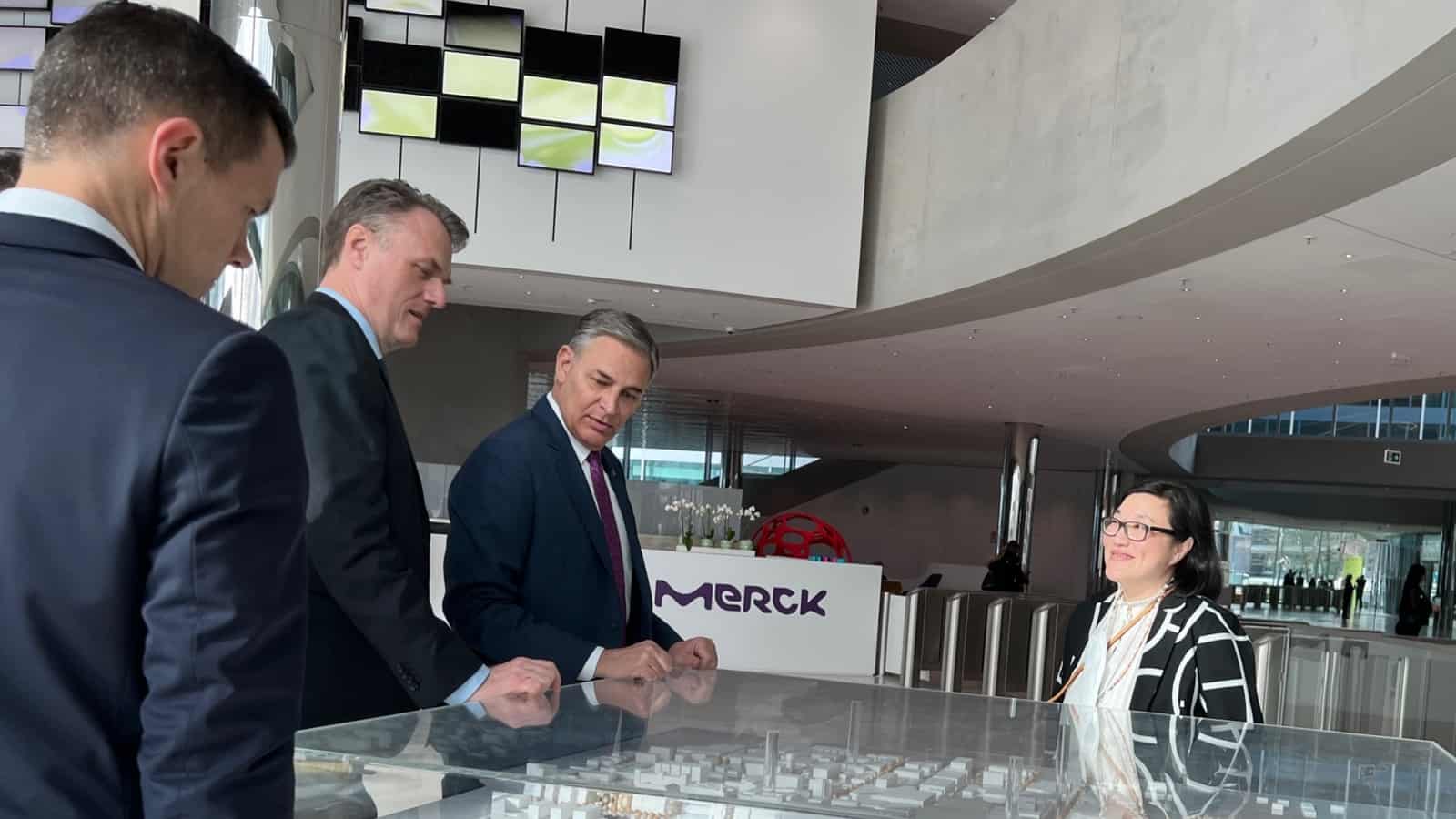
The NAM’s Competing to Win Tour in Europe continued with stops at Merck KGaA in Darmstadt and VDMA, the association of Germany’s engineering industry, in Frankfurt. The visit to Merck KGaA provided a firsthand look at the leadership, culture and operations that are producing about 300,000 products and that played an instrumental role in saving the world from the pandemic.
Living its values: Merck KGaA and its science and technology entities have 60,000 employees around the globe, with approximately 26,000 employees in 66 countries outside of Germany, including the U.S. Its products appear not only in healthcare settings, but in grocery stores where they ensure food and beverages are safe and in transportation where they monitor the air we breathe.
- Matthias Heinzel, CEO of the Merck KGaA Life Science business, and Thaddeus Burns, head of government and public affairs, welcomed the tour and provided insights into the company’s operations.
- The tour of the Merck Innovation Center showcased the company’s state-of-the-art design and technology, while the visit to the growing Membrane operations gave the tour group an opportunity to explore the latest developments.
- A brief stop in the company’s museum provided a historical perspective on the origins of the company, which was founded by the Merck family and began with a small pharmacy named Angel that is still in business today.
VDMA: The tour group also visited VDMA, the association of Germany’s engineering industry, which represents more than 3,300 companies in the sector and focuses on the advancement of trade opportunities.
The last word: The visit to Merck KGaA in Darmstadt underscored the importance of interconnectedness between the U.S. and Europe. It highlighted the vital role alliances play in strengthening enterprises that are essential to our democratic way of life and its protection worldwide.
- “Merck KGaA is a company that lives its values and is a strong champion of free enterprise, competitiveness, individual liberty and equal opportunity, putting its aspirations into action,” said NAM President and CEO Jay Timmons.
The NAM Talks Democracy, IP and Trade in Geneva
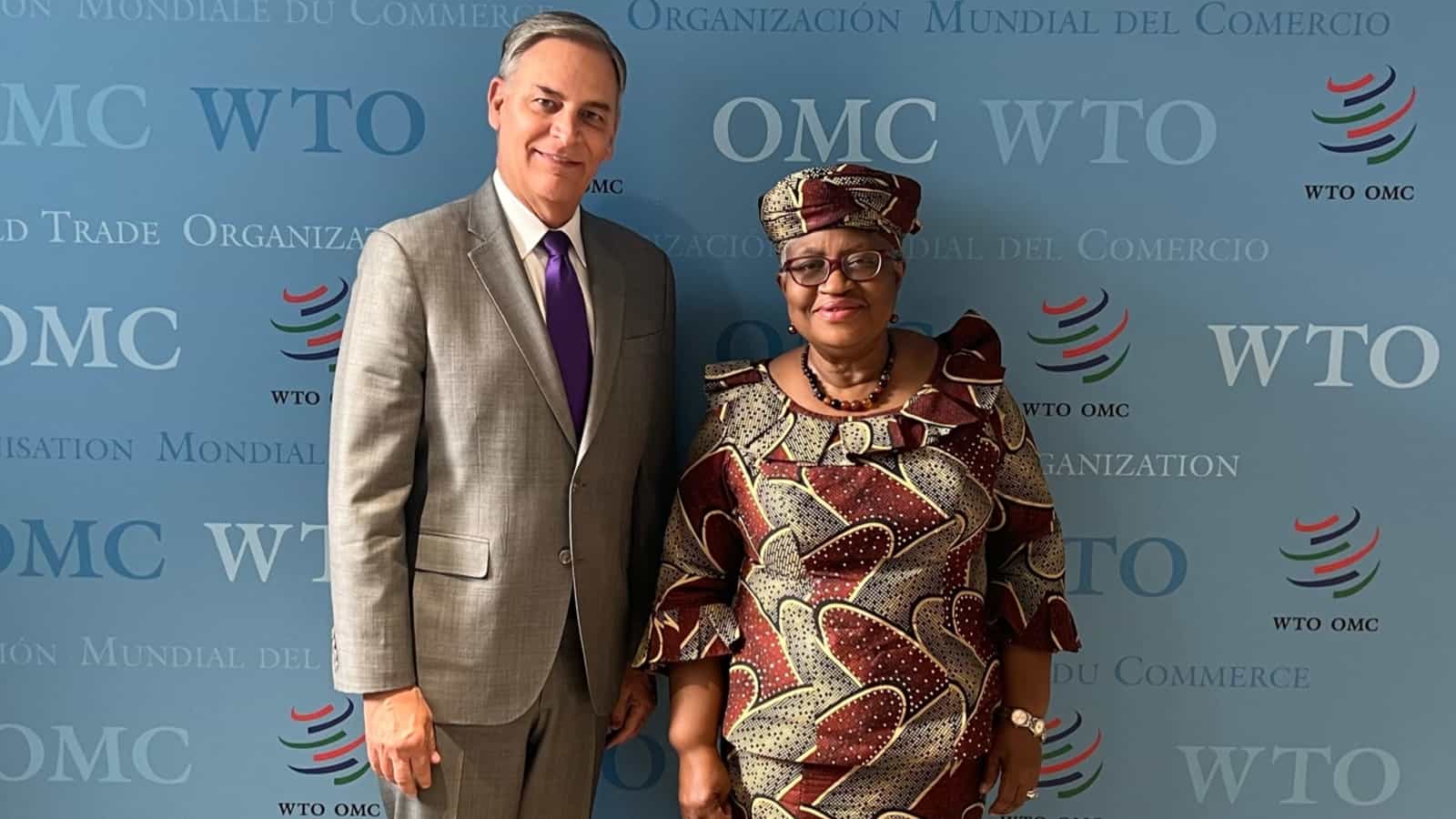
On the first two days of the NAM’s Competing to Win Tour in Europe, Timmons took part in “frank and engaging” discussions with global leaders in Geneva. The conversations focused on reinforcing transatlantic partnerships, bolstering democracy, addressing trade challenges and emphasizing the crucial role manufacturers play in promoting global stability.
The details: Timmons met with influential figures including WTO Director-General Dr. Ngozi Okonjo-Iweala, WTO Deputy Director General Angela Ellard, U.S. Ambassador to Switzerland and Lichtenstein Scott Miller and U.S. Deputy Chief of Mission in Geneva David Bisbee.
- NAM representatives also participated in an event on intellectual property co-hosted by the NAM and the International Federation of Pharmaceutical Manufacturers and Associations.
The substance: In the meetings, Timmons delved into the negative impact of the WTO/TRIPS waiver expansion, the need to restore the WTO dispute settlement system’s functionality and the crucial role of manufacturers in supporting democracies and global institutions.
- ‘“Frank & engaging discussion w/ @JayTimmonsNAM CEO of the US National Association of Manufacturers & his delegation. Focused on geopolitical tensions & impact of @wto, challenges w/ the TRIPS waiver extension to therapeutics & diagnostics, dispute settlement system & road to #MC13 [the WTO’s next ministerial conference in early 2024],” tweeted Okonjo-Iweala following the meeting.
Speech in brief: At the IFPMA event, first covered by Politico, Timmons stressed the significance of IP protections in driving innovation and developing new treatments, reinforcing the NAM’s opposition to an expansion of the TRIPS waiver to cover diagnostics and therapeutics. Attendees included Geneva-based government delegations, the WTO secretariat and NAM member companies.
- “In America, our industry works to advance the values of free enterprise, competitiveness, individual liberty and equal opportunity—the values that keep our industry strong,” said Timmons. “But increasingly, we find these values, which so many of us share, under attack—in particular from authoritarian regimes that have little regard for free markets and little respect for an individual’s right to determine their own destiny. That’s why our transatlantic relationship matters more than at any time in recent memory.”
- “[O]ne of the most important ingredients for innovation is how a country protects intellectual property. IP enshrines the understanding that years or even decades of hard work and sleepless nights, millions and millions of dollars and so much more will be rewarded,” he continued.
- “Expanding this [WTO/TRIPS waiver of IP] would set a precedent that would spiral across the manufacturing sector,” he concluded. “Some voices—here in Geneva and around the world—are already expressing desires to implement similar waivers for renewable and green energy technologies, or to automatically trigger an IP waiver for any future pandemic. If we don’t draw the line now, the outcome is obvious: an anti-innovation domino effect that destroys jobs, livelihoods and lifechanging products.”
The big picture: More than a worldwide center for diplomacy, Switzerland is the seventh largest investor in the U.S. Timmons’s visit comes at a critical inflection point for the country and amid heightened stresses on global institutions, due to COVID-19, Russia’s unprovoked war in Ukraine and competition with China, among other geopolitical challenges.
News coverage: Politico’s Morning Trade newsletter spotlighted Timmons’s trip, while The Wall Street Journal (subscription) quoted him on the importance of new U.S. trade agreements.
Next up: The tour will continue in Frankfurt, Germany, where the NAM will further demonstrate manufacturers’ leadership and the potential for a more robust transatlantic alliance.
“Competing to Win” Comes to Louisiana
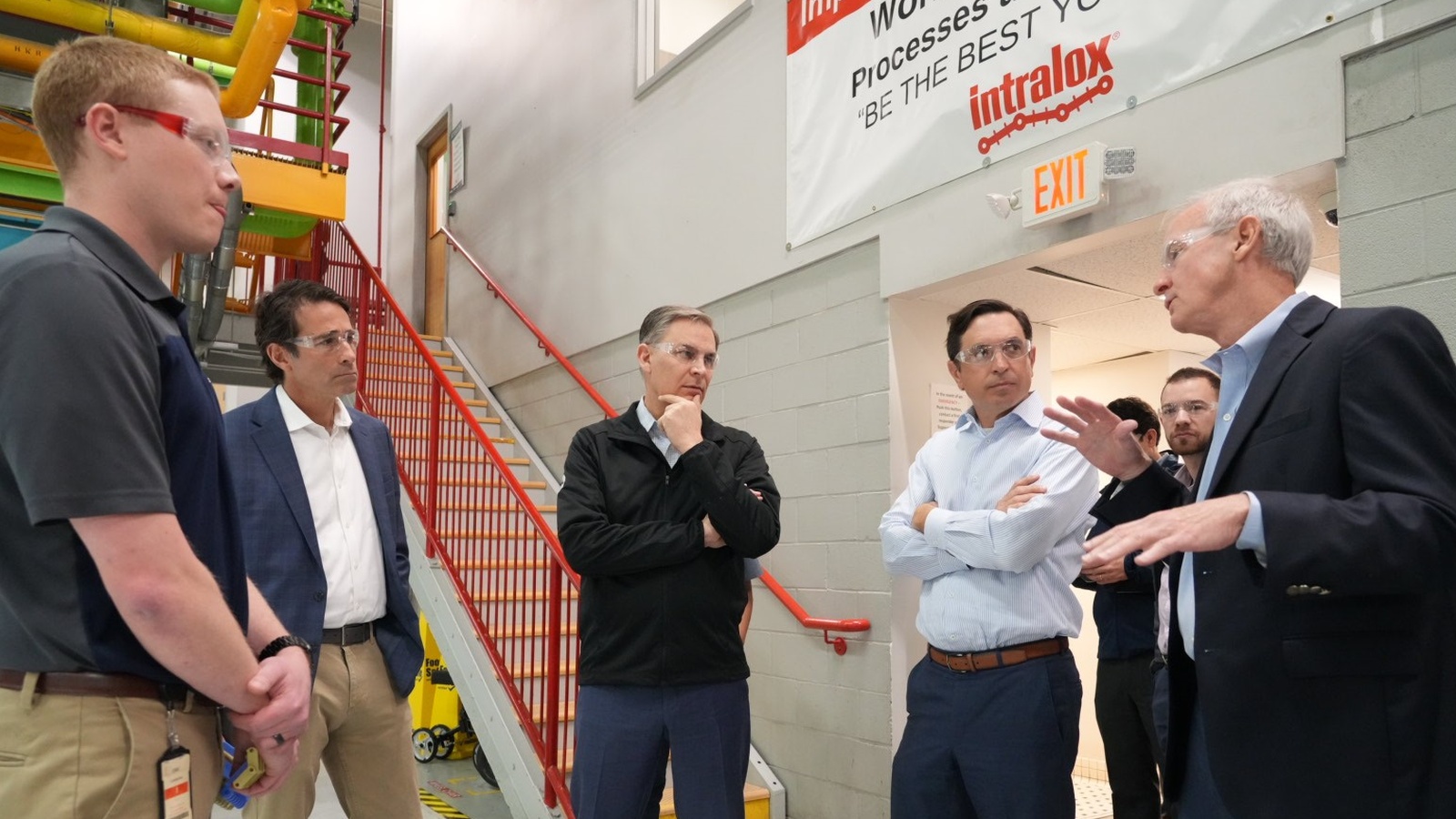
Few things are more quintessentially Louisianan than seafood and Tabasco sauce, and on the third stop of the NAM’s Competing to Win Tour on Thursday, NAM President and CEO Jay Timmons got to spend some time with both.
The first stop: Laitram LLC, the Harahan, Louisiana–based manufacturing leader in seafood and nuts processing equipment, played host to Timmons, Louisiana Rep. Garret Graves (recently tapped by House Speaker Kevin McCarthy as Elected Leadership Committee chair) and Louisiana Association of Business and Industry President and CEO Stephen Waguespack.
- Laitram President and CEO Jay Lapeyre (who also serves as chairman of the Cato Institute Board of Directors) and his team led the group through a facility tour of Intralox, a subsidiary of Laitram specializing in conveyer belts and equipment that improve productivity, food safety and reliability in high-speed package sorting.
- Timmons, Rep. Graves and Waguespack spoke with line employees across the facility, and Timmons was impressed by the company’s successes in employee retention: “Nearly everyone I met had been there a decade or more … One team member recently marked 46 years with the company,” he noted afterward.
Talking policy: Timmons moderated a roundtable discussion on manufacturing policy opportunities and challenges with Laitram’s senior staff, Rep. Graves and Waguespack after the tour.
- Lapeyre and his team expressed concerns about pass-through tax rates, which impact Laitram given that it is an S-Corp. They also raised alarms about the recent phaseout of pro-growth tax deductions for research and development and bonus depreciation.
- Trade emerged as a top priority for Laitram and its global enterprise, and Lapeyre also shared his perspective on the need for more regulatory certainty, particularly in the light of a potential new rule from the Federal Trade Commission limiting the use of noncompete agreements.
- Meanwhile, Rep. Graves emphasized the continued importance of protecting tax reform and pointed to ongoing efforts in Congress to advance permitting reform.
The second stop: The NAM team then headed to Avery Island, about two hours outside of New Orleans, where they visited McIlhenny Company, the maker of the iconic red-and-green-bottled Tabasco pepper sauce.
- Timmons was given a full tour of the 155-year-old company’s facilities, which included stops at the manufacturer’s barrel-aging warehouse, blending facility, bottling and packing plant and its onsite restaurant.
- McIlhenny Chief Operating Officer Michael Terrell—a fourth-generation employee of the company—and Agricultural Manager Christian Brown—a sixth-generation employee—guided the tour around the facility, which showed off some of the manufacturer’s recent bottling-plant innovations. These included label readers, case packers and a packet line, as well as several sustainability initiatives.
The last word: As Timmons said at the outset of the competitiveness tour, “The story of manufacturing in America is one of resilience and defying the odds. All manufacturers ask is that in Washington, when it comes to policy, don’t stack those odds against us.”
How Manufacturers and Suppliers Can Find Each Other

With supply chains in flux across the country and around the world, manufacturers frequently face obstructions that can hold up their operations and delay critical deliveries.
That’s where CONNEX Marketplace can help.
What it is: Built in collaboration with the NAM, manufacturers and other manufacturing associations, CONNEX Marketplace is a one-stop shop that brings together U.S. manufacturers and suppliers in one clear, verified and searchable database—offering a full picture of the supply chain and helping manufacturers and suppliers find the partners they need.
Why it matters: Especially at a time when supply chains are increasingly complex and constantly under strain, it’s important for manufacturers to understand the full journey of their products.
- By providing manufacturers with detailed data visualization tools as well as blacklist verification, CONNEX helps manufacturers reduce risks in their supply chains and avoid problematic routes and purchases.
How it works: Comprehensive local and national search tools offer manufacturers the opportunity to post their needs and to connect easily and quickly with suppliers using criteria including capabilities, equipment, processes and materials.
- By matching needs with available supplies, the site also helps manufacturers find alternate suppliers when necessary and improve the diversity and resiliency of their supply chains to guard against shocks and snags.
Governors support it: State leaders across the country are speaking up about the power of CONNEX, laying out the value of the program and urging manufacturers to get involved.
- “I think what you’re hearing here with CONNEX … you’re hearing the doors opening on great opportunities for Wyoming,” said Wyoming Gov. Mark Gordon. “It’s gonna expand our footprint regionally, nationally and globally.”
- CONNEX “better connects the Utah manufacturing industry, shortens and reduces supply chain costs and provides new business opportunities to Utah manufacturers and suppliers,” said Utah Gov. Spencer Cox.
- “CONNEX is hugely important,” said Oklahoma Gov. Kevin Stitt. “We’re trying to get everyone to look on this CONNEX website.… If you’re not on that and you’re a manufacturer in Oklahoma, we encourage you to engage with that.”
What we’re saying: “This one-of-a-kind tool empowers manufacturers of all sizes, both buyers and sellers, to be found, increase supply chain optimization and mitigate risk,” said NAM President and CEO Jay Timmons. “It’s a game-changer for U.S. manufacturers.”
NAM Pushes for a Robust U.S. Trade Agenda

The negotiation and implementation of robust, new trade agreements are an essential part of a manufacturing competitiveness agenda. As we head into a new year, the NAM is pressing for the kind of strong rules and partnerships the industry needs.
Forging new trade agreements: The NAM is urging policymakers to negotiate a series of substantial new trade pacts that strengthen trade ties with U.S. allies and other trading partners and expand on open trade in general. Important initiatives include:
- Negotiating regional accords, including the Indo-Pacific Economic Framework and the Americas Partnership for Economic Prosperity, which support manufacturing jobs in the U.S. by including key provisions that open markets, strengthen U.S. innovation and technology leadership, raise global standards and establish best-in-class trade rules; and
- Reengaging in trade agreement talks with the United Kingdom and Kenya and exploring trade agreements with additional markets in Latin America, Africa and beyond.
Enforcing existing pacts: The NAM is also pressing for the comprehensive enforcement of existing U.S. trade agreements—including the full implementation of the United States–Mexico–Canada Agreement and the U.S.–China “Phase One” Trade Agreement. As a strong supporter and advocate for the USMCA, the NAM is advocating the reversal of Mexican and Canadian policies that are against the letter and spirit of the agreement.
- In June, NAM President and CEO Jay Timmons laid out a series of challenges that manufacturers in the U.S. are facing in Mexico, telling the Biden administration: “Failure to prioritize enforcement of these commercial challenges will undermine the long-term credibility of the USMCA.”
Implementing a comprehensive China trade strategy: The NAM has long advocated for a comprehensive strategy for the U.S. trade relationship with China. While the U.S. and China have moved forward with important conversations, the Biden administration should implement a clear China trade and economic strategy that can strengthen our ability to compete economically with and in China, as well as hold China accountable for its behaviors.
- “The U.S. must develop, and strategically use, a full playbook of legislative and enforcement tools to pressure China to stop its discriminatory economic policies and level the playing field for manufacturers and workers in the U.S.,” NAM Vice President of International Economic Affairs Ken Monahan told the Office of the United States Trade Representative in September.
- Monahan also urged the immediate launch of a “comprehensive, transparent and robust Section 301 tariff exclusion process with meaningful retroactivity” to ensure that such measures aren’t undermining efforts to strengthen manufacturing in the U.S.
Next steps: “Manufacturers need open global markets to ensure that we benefit from the same principles that we seek here at home: nondiscrimination, fairness, equal opportunity and competition,” said Monahan. “As we look to 2023 and beyond, the forging of ambitious new U.S. trade agreements, robust enforcement of our existing accords and the implementation of a comprehensive U.S. trade strategy toward China will be vital as we advance that agenda.”
What Manufacturers Want on Trade Policy
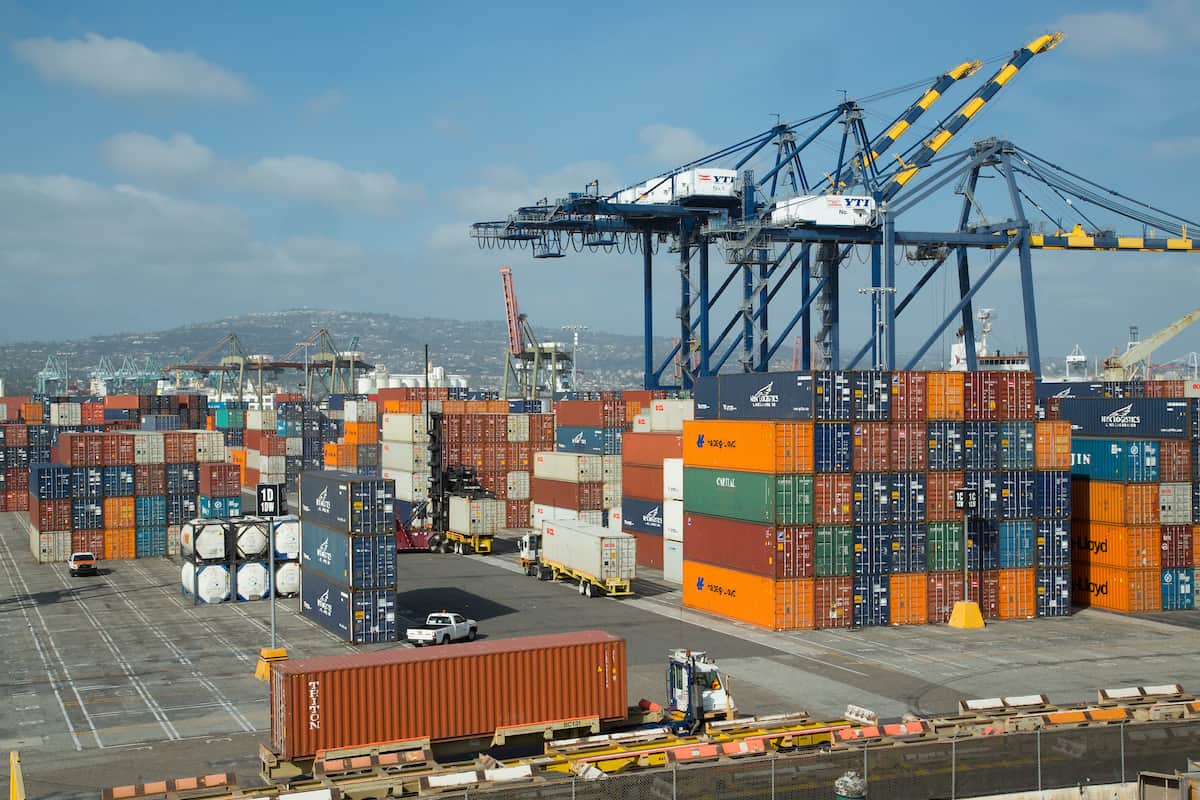
Manufacturers of all sizes must be able to compete in a global economy—and that means selling not just to consumers in the U.S., but also to the billions of consumers who live around the world. That’s why the NAM is standing up for a robust U.S. trade policy that advances strong rules and partnerships that promote open markets, improve competitiveness, increase business predictability and boost manufacturers’ ability to reach new customers abroad.
Our priorities: The NAM is interested in a U.S. trade agenda that supports open global markets so that manufacturers can benefit globally from the same principles that we value at home: nondiscrimination, fairness, equal opportunity and competition.
- It is also focused on pushing back against foreign practices that harm manufacturers and their employees in the U.S. and holding countries like China accountable. Ultimately, the NAM is committed to improving U.S. global competitiveness, supporting innovation, growing the economy and strengthening the industrial base.
Our solutions: To accomplish these goals, the NAM has offered a series of solutions for national policymakers and other leaders, including:
- Implementing the CHIPS and Science Act and pursuing additional legislation to strengthen supply chains and support a STEM workforce;
- Negotiating cutting-edge trade agreements and enforcing existing trade rules;
- Comprehensively enforcing existing U.S. trade agreements, including full implementation of the United States–Mexico–Canada Agreement;
- Standing firm in support of strong global intellectual property protections;
- Accelerating efforts toward a clear, comprehensive U.S.–China strategy that promotes fairness, accountability, enforcement and business certainty;
- Reforming international trade rules and institutions, such as the World Trade Organization;
- Bolstering U.S. export promotion and financing tools and reforming export control policies;
- Modernizing customs operations to cut red tape; and
- Updating the U.S. tariff code, including through enactment of the Miscellaneous Tariff Bill.
What we’re saying: “Manufacturers believe that strong U.S. global economic leadership and engagement with our allies—including by forging strong, enforceable U.S. trade agreements—are critical to tackling shared global challenges, expanding export opportunities, diversifying sources for trade, ensuring supply chain resiliency and promoting American values,” said NAM Vice President of International Economic Affairs Ken Monahan.
- “Without such trade deals, manufacturers in the U.S. risk being left behind our global competitors, many of whom are actively negotiating new agreements that exclude us. The time is now for the U.S. to get back in the game.”
Learn more: Find out more about the NAM’s priorities around trade in “Competing to Win”—a blueprint for policies that support manufacturing in America.
NAM VP Monahan Talks International Economics
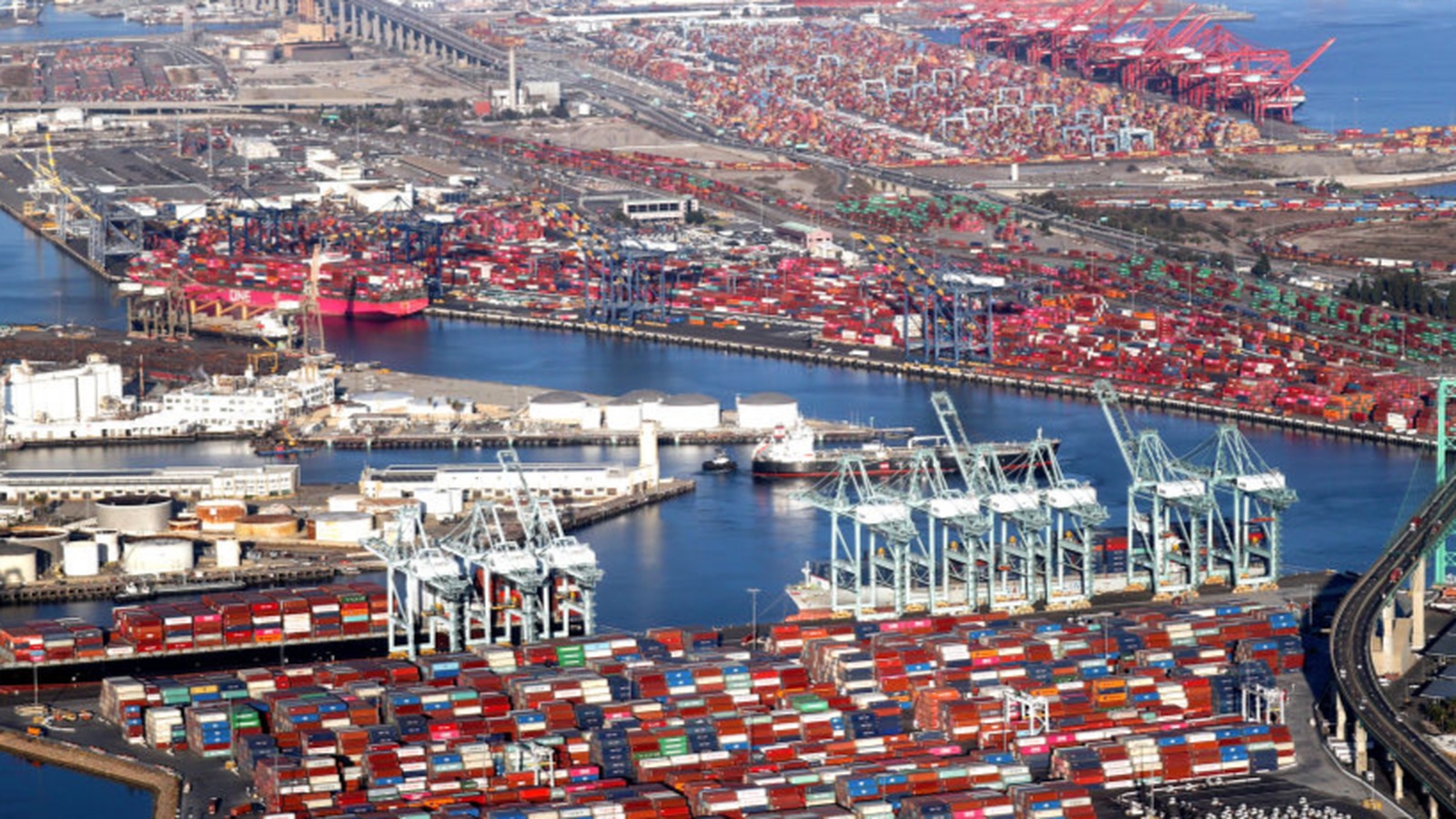
As the manufacturing industry grapples with disruptive forces in the U.S. and around the world, companies are looking for more certainty and opportunity.
NAM Vice President of International Economic Affairs Ken Monahan spoke about these issues with UPS President of International Public Affairs Penelope Naas in a panel discussion during the UPS Supply Chain Solutions virtual conference on Oct. 5.
The big idea: “Manufacturers of all sizes must be able to compete in a global economy by selling not just to consumers in the U.S., but also to billions of consumers globally,” said Monahan.
- “For us, international economic growth is core to our DNA—and it is absolutely critical that we increase opportunities for those 95% of the global population that lives outside of the U.S.”
- The NAM emphasized these broad priorities in its just-released “Competing to Win” policy agenda.
The challenge: “We’ve just seen wave after wave of supply chain disruptions, and the impact that that’s happening on the ability of manufacturers to operate and engage not just in the U.S. but globally,” said Monahan. “In a recent quarterly survey [of NAM members], 78% of our leaders listed supply chain instructions as a primary business challenge.”
- According to Monahan, the global nature of manufacturing underscores “the importance of our industry working to ease the types of global supply chain bottlenecks that are impacting so many businesses around the world … easing uncertainty and … knocking down unfair trade barriers that continue to stymie the growth of economic activity globally.”
Problems and solutions: Monahan named COVID-19, the Russian invasion of Ukraine and disclosure requirements that require more scrutiny of supply chains as key factors impacting manufacturers—and emphasized the need for diverse sources of products to ensure supply chain resiliency in the future.
Building partnerships: Monahan pointed to the importance of robust trade agreements and partnerships with economic allies to secure resilient supply chains and promote fair competition.
- “When it comes to trade, we need to think through ways in which we can deepen our partnerships with our friends and allies,” said Monahan. That means “seeking trade agreements and cutting-edge, best-in-class frameworks with our trading partners to encourage increasing standards to U.S. levels.”
Monahan also noted a series of ongoing U.S. efforts with global trading partners, including in the Indo-Pacific region, Europe, the Americas and Kenya. He made clear that the NAM is working to promote new agreements that open markets, strengthen U.S. innovation and technology standards and increase global standards around trade rules, among other priorities.
- Such U.S. global engagement is “demonstrating to manufacturers that the U.S. is back on the field,” said Monahan. “But at every opportunity, we are pushing the administration to think bigger, be even more ambitious and take this opportunity in front of it.”
Promoting transparency: Monahan spoke about the importance of manufacturers’ insight into their supply chains.
- “Companies need to be knowledgeable about as many tiers of their supply chains as possible and have strong due diligence and compliance programs in place to ensure to the maximum extent possible that goods are not being sourced or sold to entities that use forced labor or are on various export control lists,” he said.
The last word: “We need to be able to really put forward and advance the same principles globally that we do here at home as manufacturers: nondiscrimination, fairness, equal opportunity and competition,” said Monahan. “We are at our best when we are advancing those priorities globally and in the U.S.”
